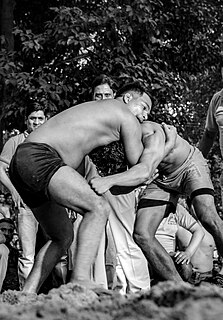 W
WGilli Danda also known as Viti Dandu, Kitti-Pul and by other variations, is a sport originating from the Indian subcontinent, played in the rural areas and small towns all over South Asia as well as Cambodia, Turkey, South Africa, Italy, Poland, and in some Caribbean islands like Cuba. The game is played with two sticks: a large one called a danda , which is used to hit a smaller one, the gilli . Other than using a smaller target stick, rather than a ball, it bears many similarities to bat and ball games such as cricket and baseball.
 W
WFighter kites are kites used for the sport of kite fighting. Traditionally most are small, unstable single-line flat kites where line tension alone is used for control, at least part of which is manja, typically glass-coated cotton strands, to cut down the line of others.
 W
WBoli Khela or Bali Khela is a traditional form of wrestling in Bangladesh, particularly popular in the Chittagong area considered as a national game of the district. It is a form of combat sport involving grappling type techniques such as clinch fighting, throws and takedowns, joint locks, pins and other grappling holds. It is one of the oldest traditions of the Chittagong. The sporting event, held in the first month of the Bengali year date of 7th, always takes place at Madarsha Union as Mokkaro boli khela & same month date of 12th, always takes place at Laldighi Maidan as Jabbarer Boli khela.
 W
WKabaddi is a contact team sport. Played between two teams of seven players, the objective of the game is for a single player on offence, referred to as a "raider", to run into the opposing team's half of a court, tag out as many of their defenders as possible, and return to their own half of the court, all without being tackled by the defenders, and in a single breath. Points are scored for each player tagged by the raider, while the opposing team earns a point for stopping the raider. Players are taken out of the game if they are tagged or tackled, but are brought back in for each point scored by their team from a tag or tackle.
 W
WKho Kho is a popular tag game invented in Maharashtra, India. It is played by teams of 12 nominated players out of fifteen, of which nine enter the field who sit on their knees, and 3 extra who try to avoid being touched by members of the opposing team. It is one of the two most popular traditional tag games in the Indian subcontinent, the other being Kabaddi. The sport is widely played across South Asia and has a strong presence in South Africa and England.
 W
WLathi khela is a traditional Bengali martial art – a kind of stick fighting practised India and Bangladesh. A practitioner is known as a lathial.
 W
WPambaram பம்பரம், Pambaram പമ്പരം, Buguriಬುಗುರಿ, Lattu لٹو , Bongaram బొంగరం, Latim লাটিম is a traditional throwing top used mainly in India and Bangladesh. In Telangana and Andhra Pradesh, its name is "Bongaralu Aata". This game can be played by all age group.
 W
WMokkar Boli Khela is a special type of wrestling game, which is held in Madarsha Union under Chittagong Satkania Upazila every year on 07th Baishakh of Bengali year. The participants in this game are called "Bali". In the regional language of Chittagong, it is known as Bali khela.
 W
WNouka Baich is a traditional dragon boat-style rowing sport of Bangladesh. The Bangladesh Rowing Federation, established in 1974, is the authority of all rowing activities in Bangladesh and has organised over 40 National Rowing Championships. The races are held during the wet and autumn seasons of the Bengali calendar which corresponds from June to October in the Gregorian calendar. The "Nowka Bais" which takes place annually in Birmingham is a leading cultural event in the West Midlands, United Kingdom attracting not only the Bangladeshi diaspora but a variety of cultures. It is also the largest kind of boat race in the United Kingdom.
 W
WPehlwani, also known as kushti, is a form of wrestling contested in the Indian subcontinent. It was developed from native Indian malla-yuddha. The words pehlwani and kushti derive from the Persian terms pahlavani (heroic) and koshti respectively, meaning Heroic wrestling. It is likely that the word derives from the Iranian word "Pehalavi" denoting to people of Iranian descent.